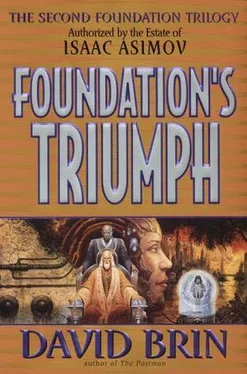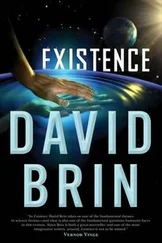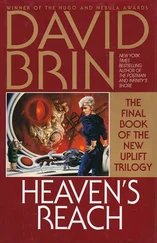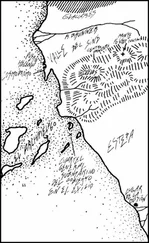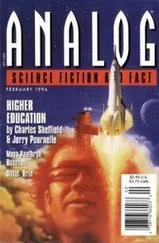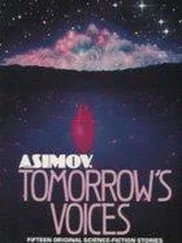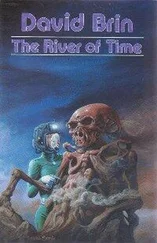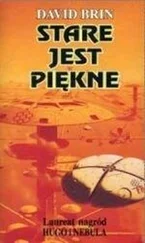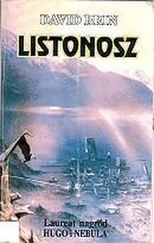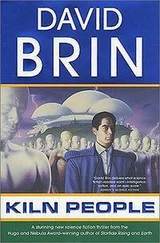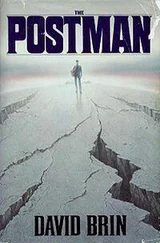David Brin - Foundation’s Triumph
Здесь есть возможность читать онлайн «David Brin - Foundation’s Triumph» весь текст электронной книги совершенно бесплатно (целиком полную версию без сокращений). В некоторых случаях можно слушать аудио, скачать через торрент в формате fb2 и присутствует краткое содержание. Год выпуска: 1999, ISBN: 1999, Издательство: Harper Prism, Жанр: Фантастика и фэнтези, на английском языке. Описание произведения, (предисловие) а так же отзывы посетителей доступны на портале библиотеки ЛибКат.
- Название:Foundation’s Triumph
- Автор:
- Издательство:Harper Prism
- Жанр:
- Год:1999
- ISBN:ISBN: 0-06-105241-8
- Рейтинг книги:4 / 5. Голосов: 1
-
Избранное:Добавить в избранное
- Отзывы:
-
Ваша оценка:
- 80
- 1
- 2
- 3
- 4
- 5
Foundation’s Triumph: краткое содержание, описание и аннотация
Предлагаем к чтению аннотацию, описание, краткое содержание или предисловие (зависит от того, что написал сам автор книги «Foundation’s Triumph»). Если вы не нашли необходимую информацию о книге — напишите в комментариях, мы постараемся отыскать её.
Foundation’s Triumph — читать онлайн бесплатно полную книгу (весь текст) целиком
Ниже представлен текст книги, разбитый по страницам. Система сохранения места последней прочитанной страницы, позволяет с удобством читать онлайн бесплатно книгу «Foundation’s Triumph», без необходимости каждый раз заново искать на чём Вы остановились. Поставьте закладку, и сможете в любой момент перейти на страницу, на которой закончили чтение.
Интервал:
Закладка:
“But after all, did they not make us in their image? True, we have great powers and extensive lives, but does that really mean we can’t suffer from similar faults? Isn’t it possible for us to be equally crazy? To be out of our positronic minds?”
He smiled, this time with a warmth-and sadness-that reminded her of Hari.
“Something happened to us twenty thousand years ago, Dors. It happened to all of us, not only humans. And we’ll never know the right thing to do, until we find the truth about those bygone days.”
7.
This time, for some reason, everyone watched the takeoff from Pengia through the vessel’s west-facing view ports. The pleasant little world-indistinguishable from millions of others-fell away below the Pride of Rhodia as they headed off toward their next destination, one that R. Gornon still refused to name.
“There is something I want to show you, Dr. Seldon,” the robot said, as the ship climbed along a spiral departure orbit.
Hari had been musing about young Jeni during liftoff. And that, in turn, made him think about all the other members of the Encyclopedia Foundation who were being herded aboard transports at this moment, to be sent to far-off Terminus. Was it just a month since he had finished recording messages to be played back on that distant world, at decisive moments determined by his equations-when a word of encouragement or gentle suggestion from the father of psychohistory might make a crucial difference toward the Foundation becoming a great and stable civilization? Now, his body might seem a bit younger, but Hari’s soul felt older.
“Please, Gornon. Just leave me alone.”
He felt a hand at his elbow.
“I am certain that you’ll want to see this, Professor. If you’d just come to the east-facing view port.”
The suggestion. for some reason, struck Hari as impertinent. He was getting sick and tired of being pushed around by this damn Calvinian! But before he could voice a sharp putdown, Gornon added
“I believe I can show you the solution to one of your most vexing psychohistorical problems. Something that has puzzled you for decades. If you’ll strive to overcome the sensations that are now churning within you, I’m certain the effort will be rewarded.”
Surprised by Gornon’s words, Hari let himself be led to the indicated port, diametrically opposite from where Maserd and Horis were staring at the view below. “This had better be worth it,” Hari muttered.
He gave the magnified scene a perfunctory look, but could perceive no difference from what Horis and Maserd saw-a receding planet below, and a diffuse spray of untwinkling stars above.
“I don’t see anything. If this is some kind of a joke-”
“Be assured, it will be everything I promised. But first you must allow me to take liberties.”
Hari saw the robot hold forth a shimmering object, shaped like a close-fitting skullcap made of countless luminous gems. Gornon moved to place it on Hari’s head.
“Get that thing away, you mannequin of rusty-”
R. Gornon did not relent.
“I’m sorry, Professor, but your command is invalid. It does not come from your native human will. Therefore, it can be overridden for a greater good. This won’t hurt.”
Gornon was so implacably strong that his gentle insistence caused no pain as he slid the skullcap over Hari’s head and drew him irresistibly back to the window.
Hari abruptly felt all his rancorous irritability wash away. What’s happening to me?
“Now please look again, Professor.”
Hari shivered. He had spent years in the company of robots, knowing a secret shared by few other humans, and even living as husband to one of them. Yet he still found mentalic interference disturbing.
“What is this thing doing to me?” He felt calmer than before, yet worried.
“It’s not controlling you, Professor. Rather, it is a shield, sheltering your mind from a powerful influence pervading this region.”
Gornon pointed with a long finger toward a patch of space they had both glanced at just moments before. This time, when Hari looked, he saw something that hadn’t been there before! At least, he had not noticed it.
He stared at some kind of orbiting platform, perhaps like those used for relaying communications around a planetary surface, or for trans-shipping special cargoes. Only this one showed no sign of airlocks or complex antennae. At Gornon’s command, the view screen magnified its surface, so heavily pitted with micrometeorite scars that its great age was suddenly apparent.
It looks like a cousin to those terraformers we saw back in the Thumartin Nebula, he thought. Perhaps the relic has been drifting here for thousands of years.
But then why the mystery? Why didn’t I notice it the first time?
He felt Gornon watching him. Hari had never liked taking tests, which was one reason why he rushed through graduate school by age twelve-to become the teacher instead of the pupil. Now he felt the pressure of expectation.
What did Gornon just promise? An answer to one of my most bothersome questions?
Well, there was the problem of damping coefficients. Fully understanding all the factors that Daneel had used to keep the Galactic Empire stable and safe for humanity, across fifteen thousand years. Hari understood how bao jin traditions and master-apprentice systems enhanced conservatism. The five-caste social structure contributed elegantly. So did the skillfully designed linguistic assumptions inherent in Galactic Standard, a language filled with so many redundancies that it accepted new words and new thoughts only at a glacial pace.
Nevertheless, there remained a problem. None of it was sufficient. Nothing yet explained how twenty-five million worlds could stay static and serene for so long.
“Are you saying…that thing out there”
Hari reached up and lifted one edge of the skullcap. A wave of emotions fluxed. He suddenly resented the robot deeply, and wanted nothing better than to turn away from this panorama. To return to his friends at the west-facing view port.
Hari let the flap drop back in place. The irritation vanished. In a hoarse voice, he whispered, “Mentalic suasion! Of course. If Daneel and some of his comrades can do it, why not mass-produce a specialized positronic brain for each world? twenty-five million isn’t such a great number, especially if you have thousands of years.”
He turned to look archly at Gornon. “But how could such a thing be possible? To sway the population of an entire planet?”
The robot smiled. “It is not only possible, Professor. The method was tried by the very earliest mentalic robot. R. Giskard Reventlov first thought of using this device to influence whole planetary populations, by detecting and sifting neural electrical patterns and then gently nudging repeatedly, building slowly toward the kinds of resonance patterns that encourage tranquility. Equanimity. Goodwill. In fact, these machines are named after Giskard. They are guardians of human serenity and peace.
“I assume there is already a place for them in your equations?”
Hari nodded, staring, but his eyes did not see. Rather, his mind gyred with mathematics. He saw at once how this provided much of what had been missing! An explanation for why most eruptions of chaos simply dissipated harmlessly, like a fire that had been quenched for lack of oxygen. A reason, also, why so few human beings lived outside of planets, even though asteroid outposts or those placed in strange environments had proved possible. Space life was hardly compatible with this damping mechanism! So it would naturally be discouraged.
And yet these “Giskards” aren’t working as well as they used to, once upon a time. Chaos outbreaks are more frequent, despite everything done to repress them. Only the empire’s fall will bring the recent wave of infections to a halt. These obsolete methods will be useless in a few years, no matter what.
Читать дальшеИнтервал:
Закладка:
Похожие книги на «Foundation’s Triumph»
Представляем Вашему вниманию похожие книги на «Foundation’s Triumph» списком для выбора. Мы отобрали схожую по названию и смыслу литературу в надежде предоставить читателям больше вариантов отыскать новые, интересные, ещё непрочитанные произведения.
Обсуждение, отзывы о книге «Foundation’s Triumph» и просто собственные мнения читателей. Оставьте ваши комментарии, напишите, что Вы думаете о произведении, его смысле или главных героях. Укажите что конкретно понравилось, а что нет, и почему Вы так считаете.
